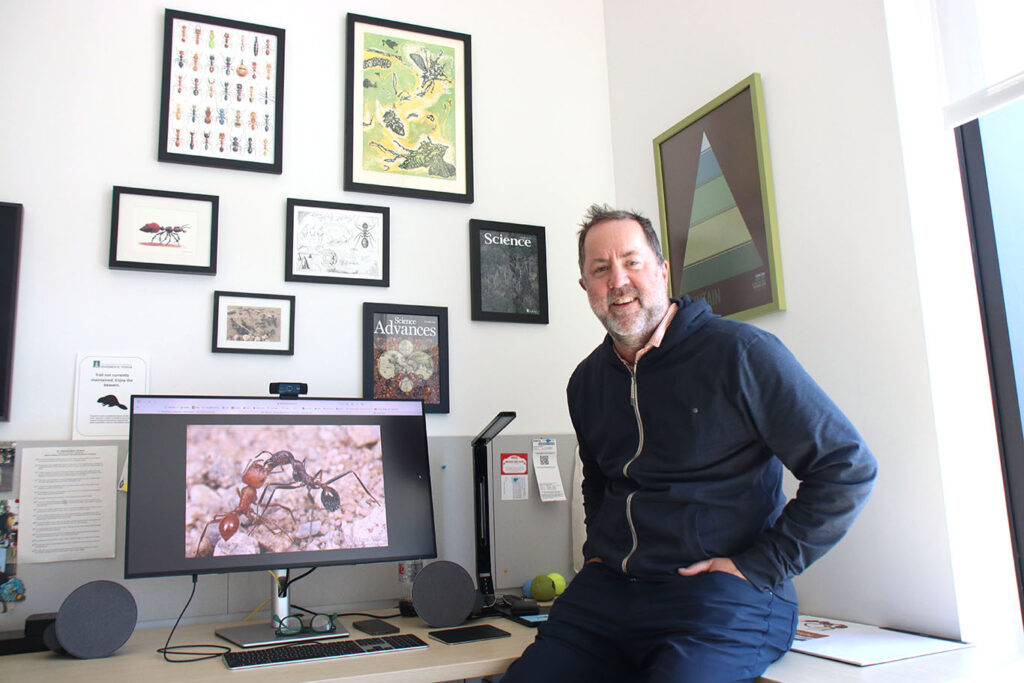FACULTY – Faculty Lead for Year of Sustainability & Chair of Ecology and Evolutionary Biology.
“So I grew up in Arkansas, and in the summers of high school, a friend and I would go to Colorado and backpack and fish for a couple weeks. And so I fell in love with mountains. And then it was time to go to college and I thought, well, I can go to the University of Colorado. And so I went there, and I studied mountains. You know, where I grew up in Arkansas, it was pretty rural. And so I spent a lot of time out running around, you know, looking for birds, looking for bugs under rocks, trying to catch salamanders. And given that passion for all that stuff, when I went to college, I, of course, decided to be a physical therapy major. And thankfully, that meant that I didn’t have to take general biology. Instead, I took biology for non majors, and then general zoology, and I loved both those classes. And in the general zoology class, one of the labs was something called the taxonomic treasure hunt, which I do in my own courses now here. And in the taxonomic treasure hunt, you got one point for every animal you can identify using its scientific name in the field. And so I was really good at it. The professor was in the class with us, and I turned over a log and identified these termites and then I also identified the bacteria in their gut. And he said, “What’s your major?” And I said, ‘physical therapy.’ And he said, ‘you know you can get paid for this, right?’ That is, running around the woods, turning over logs, identifying things, which is what I’d always done as a kid. And so the next day I changed my major. “

“[Another] real turning point, for me, was reading a book by Bill McKibben called Planet X. And in it, he stresses the point that we have to quit talking about the future impacts of climate change. So one of the talking points in the, you know, early 2000s-2010s was, “what kind of planet do you want to leave for your grandchildren?” And then it became “what kind of planet do you want to leave for your children?” But now we see the impacts of global change. Daily, you can look at any news source and see some of the impact of climate change affecting people’s day to day lives.
You know, it sounds strange to say, but as a scientist, I don’t put faith in things that they will work out, I want to see the data indicating that they will work out, I don’t have faith in humanity to save the planet. Instead, I see a lot of really smart people coming up with really elegant solutions to big problems. And that data helped me think about the world and where it’s headed. I mean, of course, I’m inspired by the work I do. And it’s the reason..seeing the things I’ve seen in the places I’ve seen them…is the reason I think we all have to work harder to stop climate change. I’ve had the privilege to [have] had opportunities to go to Costa Rica and Kenya and Tanzania, and Mexico, and other places around the world to experience what I think is the most amazing thing about the planet, and that is the incredible wealth of biodiversity that exists on it with us and that we so deeply rely on. I think there’s biodiversity around us every day. I mean, even in the depths of winter, if you walk across campus right now, there will be birds fluttering in the bushes, there will be squirrels out and about as every Michigan student knows. You know, occasionally a white tailed deer wanders through campus. And then there’s this incredible unseen biodiversity and you know, the bushes and in the leaf litter that we don’t see unless we look. Y’know, just in front of my building [last] semester. I saw two separate praying mantises capturing pollinating bees out of thin air. I mean, it’s an incredible set of adaptations that this Mantid has to capture its prey. And that’s happening right outside our building on this campus. You know, so biodiversity is all around us, we just have to know where to look for it. And we have to work to save it.
[And to save it], we have to reduce the amount of carbon dioxide we’re pumping into the atmosphere, period. That’s it. I mean, we’ve known for over 100 years that adding carbon dioxide dioxide to the atmosphere will increase the temperature on the planet. That is a scientific fact. So if you want to reduce temperatures, or even maintain them at an acceptable level, we have to reduce the amount of carbon dioxide going into the atmosphere. And that’s irrefutable.“
As part of the LSA Year of Sustainability, LSA Dean’s Fellow Cherish Dean sat down with a range of students, staff, and faculty across the University to illustrate the various relationships people across campus already have to this work, to showcase ways people can get involved, and to highlight the reasons that this work should matter.
To view an abbreviated transcript of Cherish’s full conversation with Nate, click here.
Cherish can be reached at [email protected]. To contact the LSA Year of Sustainability Team as a whole, please contact [email protected] .

